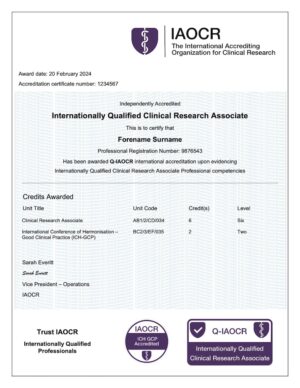The International Accrediting Organization for Clinical Research (IAOCR) advises clinical research professionals to exercise due diligence and invest in meaningful professional recognition to enhance their careers. With concerns about fake qualifications and widespread candidate fraud in the CRA community, CRAs and employers must understand the important role of membership organizations, certification, accreditation and accrediting organizations.
There are similarities between accreditation and certification. Both assess CRA competencies, support career pathways and provide opportunities for CRAs. Both work with the industry to agree on assessment criteria and set appropriate questions. However, there are also significant differences so to help you choose the most effective path for your clinical research career, we’ve compared the similarities and differences between certification and accreditation of individuals, as well as the roles of different organizations involved.
Certification
Certification in clinical research is a recognition that an individual has met specific standards and possesses the necessary knowledge to perform their role effectively.
Certification generally tests knowledge only, usually through a multiple-choice style examination test often set by an independent committee working closely with a certifying organisation. However, different membership organizations operate their processes in different ways because there is no regulated requirement in this space. A number of membership organizations offer certification that is recognized within their region. This can be a good choice for early-career CRAs in their respective countries. Membership organizations often also provide a valuable service to CRAs in terms of providing networking, educational opportunities, conferences, etc).
Key components generally include
- MCQ-based (multiple choice questions)
- Tests compiled by a committee of experienced clinical research professionals
- Requirement to maintain membership with the awarding organization
- Requirement to re-certify by participating in regular tests/exams
- Regionally focused
- No assessor feedback on performance
- Certification may include CPD (continuing professional development) points
Accreditation
Accreditation is formal recognition that a clinical research professional has met specific standards and possesses the skills, knowledge and behaviors to perform their role to global industry standards. The exam complexity is designed to comply with international qualifications standards, allowing for internationally recognized Learning Credits to be awarded. Accreditation ensures that the individual is competent, based on them providing evidence that they meet stringent, independently accredited assessment criteria. The focus is on ensuring they have the ability to perform their role effectively and to competence standards agreed with leading employers.
Key components include
- MCQ + short essay style questions + examples of workplace competence
- The examination method is standardized and quality-assured through regulated educational bodies
- Accreditation is awarded independently of membership organizations – no membership fees are involved
- Accreditation is awarded once and cannot be removed
- Core global standards are assessed
- Assessor feedback
- Accreditation includes Learning Credits and CPE (continuing professional education) points
- Unique, traceable registration number that can be verified by employers
What to choose and when
Deciding between individual certification or professional accreditation hinges on the specific career outcomes you seek to achieve at the time.
Clinical researchers who are setting out in their career, and have neither certification nor accreditation, can participate in accreditation at a foundation level. This can provide a first stepping stone onto a clinical research career pathway. Then, after gaining time in the role and having gained the competencies that have been defined by the industry, they can participate in further professional accreditation and/or certification.
If you already have a regionally recognised certification, accreditation is a great way to elevate your career and status because it evidences that you have been robustly assessed to global standards in compliance with a meaningful educational standard in this very global of industries.
If you already gained accreditation, joining a membership organisation will provide networking and training opportunities. As you move through your career, you can grow your professional education portfolio through certification, accreditation and other continuing professional education opportunities.










